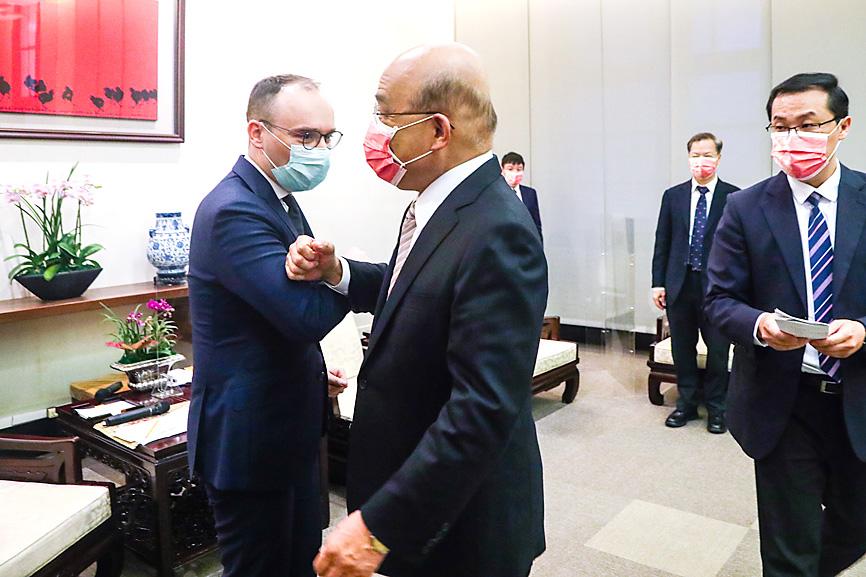The head of the Lithuanian parliament’s Taiwan friendship group yesterday said he and other lawmakers from Baltic states are visiting Taiwan to show their support for the country amid Chinese threats.
“We are here to express solidarity with you,” Lithuanian Member of Parliament Matas Maldeikis told President Tsai Ing-wen (蔡英文) during a visit yesterday morning.
Maldeikis is leading a joint delegation comprising legislators from Estonia, Latvia and Lithuania who are to participate in a conference on democracy later this week in Taipei.

Photo: CNA
Maldeikis said during his meeting with Tsai that the delegation members respect Taiwanese’s “perseverance and wisdom” in managing to build a successful economy and promoting democracy while balancing a “complicated geopolitical environment.”
He said that the Lithuanian government’s pro-Taiwan policy has received wide support at home because “preserving freedom and the rules-based international order is of vital interest for both Lithuania and Taiwan.”
Maldeikis said that he hopes the soon-to-be-opened Lithuanian trade office will help expand the partnership between the countries and contribute to closer relations between Taiwan and the EU.
Tsai invited the lawmakers to attend the Open Parliament Forum on Thursday and Friday, which is to discuss the promotion of democracy and open parliaments.
Their visit marks the first time lawmakers from all three Baltic states have sent a joint delegation to Taiwan, Tsai said.
“Taiwan and the Baltic nations share similar experiences of breaking free from authoritarian rule and fighting for freedom,” she said.
“The democracy we enjoy today was hard-earned. This is something we all understand most profoundly,” she added.
As the world faces challenges caused by the expansion of authoritarianism and threat of disinformation, Taiwan is willing to share its experience combating disinformation with its European friends, Tsai said.
Other members of the delegation that visited the Presidential Office yesterday included Janis Vucans and Juri Jaanson, members of parliament and chairs of Taiwan friendship groups in Latvia and Estonia respectively.
They are to join lawmakers from Belize and Mexico for the two-day forum organized by the Ministry of Foreign Affairs, Legislative Yuan and US nonprofit National Democratic Institute.
A host of experts, academics and lawmakers from countries including Argentina, Australia, the Czech Republic, France, Germany, Japan, Sri Lanka, the UK and the US are to participate virtually, the ministry said.
The visit comes as Taiwan enhances exchanges with the EU and ties with the bloc’s member states, Lithuania in particular.
Earlier this month, Taiwan inaugurated its representative office in Lithuania’s capital, Vilnius, as part of a reciprocal deal the two nations reached in August, which would also see Lithuania open a representative office in Taipei early next year.

NATIONAL SECURITY THREAT: An official said that Guan Guan’s comments had gone beyond the threshold of free speech, as she advocated for the destruction of the ROC China-born media influencer Guan Guan’s (關關) residency permit has been revoked for repeatedly posting pro-China content that threatens national security, the National Immigration Agency said yesterday. Guan Guan has said many controversial things in her videos posted to Douyin (抖音), including “the red flag will soon be painted all over Taiwan” and “Taiwan is an inseparable part of China,” while expressing hope for expedited “reunification.” The agency received multiple reports alleging that Guan Guan had advocated for armed reunification last year. After investigating, the agency last month issued a notice requiring her to appear and account for her actions. Guan Guan appeared as required,

A strong cold air mass is expected to arrive tonight, bringing a change in weather and a drop in temperature, the Central Weather Administration (CWA) said. The coldest time would be early on Thursday morning, with temperatures in some areas dipping as low as 8°C, it said. Daytime highs yesterday were 22°C to 24°C in northern and eastern Taiwan, and about 25°C to 28°C in the central and southern regions, it said. However, nighttime lows would dip to about 15°C to 16°C in central and northern Taiwan as well as the northeast, and 17°C to 19°C elsewhere, it said. Tropical Storm Nokaen, currently

‘NATO-PLUS’: ‘Our strategic partners in the Indo-Pacific are facing increasing aggression by the Chinese Communist Party,’ US Representative Rob Wittman said The US House of Representatives on Monday released its version of the Consolidated Appropriations Act, which includes US$1.15 billion to support security cooperation with Taiwan. The omnibus act, covering US$1.2 trillion of spending, allocates US$1 billion for the Taiwan Security Cooperation Initiative, as well as US$150 million for the replacement of defense articles and reimbursement of defense services provided to Taiwan. The fund allocations were based on the US National Defense Authorization Act for fiscal 2026 that was passed by the US Congress last month and authorized up to US$1 billion to the US Defense Security Cooperation Agency in support of the

PAPERS, PLEASE: The gang exploited the high value of the passports, selling them at inflated prices to Chinese buyers, who would treat them as ‘invisibility cloaks’ The Yilan District Court has handed four members of a syndicate prison terms ranging from one year and two months to two years and two months for their involvement in a scheme to purchase Taiwanese passports and resell them abroad at a massive markup. A Chinese human smuggling syndicate purchased Taiwanese passports through local criminal networks, exploiting the passports’ visa-free travel privileges to turn a profit of more than 20 times the original price, the court said. Such criminal organizations enable people to impersonate Taiwanese when entering and exiting Taiwan and other countries, undermining social order and the credibility of the nation’s